《罗密欧与朱丽叶》主要人物性格分析范本.doc
- 格式:doc
- 大小:18.50 KB
- 文档页数:2
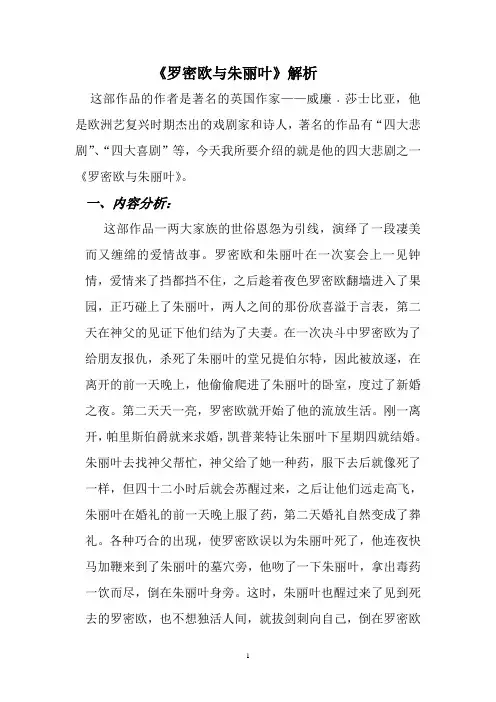
《罗密欧与朱丽叶》解析这部作品的作者是著名的英国作家——威廉﹒莎士比亚,他是欧洲艺复兴时期杰出的戏剧家和诗人,著名的作品有“四大悲剧”、“四大喜剧”等,今天我所要介绍的就是他的四大悲剧之一《罗密欧与朱丽叶》。
一、内容分析:这部作品一两大家族的世俗恩怨为引线,演绎了一段凄美而又缠绵的爱情故事。
罗密欧和朱丽叶在一次宴会上一见钟情,爱情来了挡都挡不住,之后趁着夜色罗密欧翻墙进入了果园,正巧碰上了朱丽叶,两人之间的那份欣喜溢于言表,第二天在神父的见证下他们结为了夫妻。
在一次决斗中罗密欧为了给朋友报仇,杀死了朱丽叶的堂兄提伯尔特,因此被放逐,在离开的前一天晚上,他偷偷爬进了朱丽叶的卧室,度过了新婚之夜。
第二天天一亮,罗密欧就开始了他的流放生活。
刚一离开,帕里斯伯爵就来求婚,凯普莱特让朱丽叶下星期四就结婚。
朱丽叶去找神父帮忙,神父给了她一种药,服下去后就像死了一样,但四十二小时后就会苏醒过来,之后让他们远走高飞,朱丽叶在婚礼的前一天晚上服了药,第二天婚礼自然变成了葬礼。
各种巧合的出现,使罗密欧误以为朱丽叶死了,他连夜快马加鞭来到了朱丽叶的墓穴旁,他吻了一下朱丽叶,拿出毒药一饮而尽,倒在朱丽叶身旁。
这时,朱丽叶也醒过来了见到死去的罗密欧,也不想独活人间,就拔剑刺向自己,倒在罗密欧身上死去。
逐渐的两家的父母都来了,神父向他们讲述了罗密欧和朱丽叶之间的爱情故事,这时两家的父母才清醒过来,从此,两家消除积怨,并在城中为罗密欧和朱丽叶铸了一座金像,纪念他们的爱情。
他们彼此一见钟情爱上的却是对方的仇人,这样的情况结局只有两种:1、他们用爱的力量冲破仇恨的枷锁,寻找属于自己的自由与幸福2、要么就是用他们之间伟大的爱情来融化两个家族之间的恩怨,找到打开加锁的那把钥匙。
他们之间的爱情是封建社会会的牺牲品,但是他们的爱情是伟大的,是可歌可泣的,他们勇于冲破封建的思想,追求一种自由、和平的生活。
这部作品也是借助凄美的爱情故事,来表达作者对封建社会的不满、讽刺和批判。
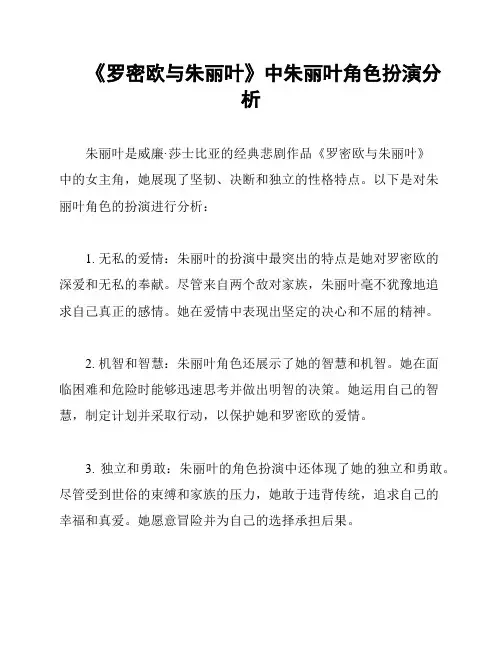
《罗密欧与朱丽叶》中朱丽叶角色扮演分
析
朱丽叶是威廉·莎士比亚的经典悲剧作品《罗密欧与朱丽叶》
中的女主角,她展现了坚韧、决断和独立的性格特点。
以下是对朱
丽叶角色的扮演进行分析:
1. 无私的爱情:朱丽叶的扮演中最突出的特点是她对罗密欧的
深爱和无私的奉献。
尽管来自两个敌对家族,朱丽叶毫不犹豫地追
求自己真正的感情。
她在爱情中表现出坚定的决心和不屈的精神。
2. 机智和智慧:朱丽叶角色还展示了她的智慧和机智。
她在面
临困难和危险时能够迅速思考并做出明智的决策。
她运用自己的智慧,制定计划并采取行动,以保护她和罗密欧的爱情。
3. 独立和勇敢:朱丽叶的角色扮演中还体现了她的独立和勇敢。
尽管受到世俗的束缚和家族的压力,她敢于违背传统,追求自己的
幸福和真爱。
她愿意冒险并为自己的选择承担后果。
4. 悲剧结局:尽管朱丽叶表现出坚毅和勇气,但她最终面临悲剧的结局。
她在无法与罗密欧团聚的情况下选择了自杀,为了与罗密欧在生命的另一面相聚。
这一结局显示了朱丽叶的决心和牺牲精神。
总之,朱丽叶在《罗密欧与朱丽叶》中的角色扮演展示了她的独立、机智和坚毅特质,同时也体现了她对爱情的无私奉献。
尽管悲剧的结局使她付出了生命的代价,但她的形象仍会在读者心中留下深刻的印象。
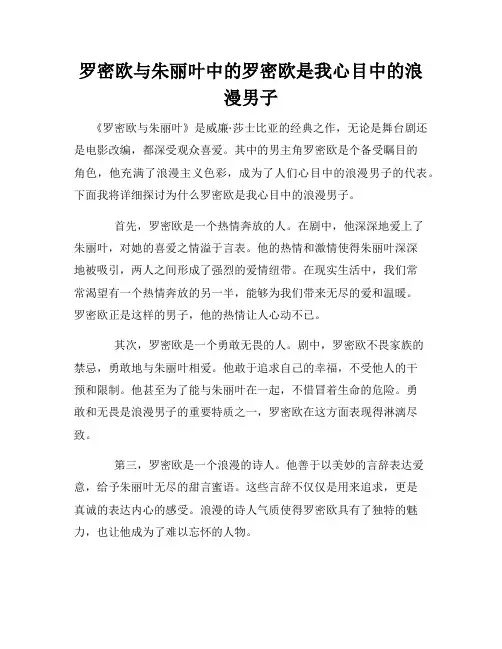
罗密欧与朱丽叶中的罗密欧是我心目中的浪漫男子《罗密欧与朱丽叶》是威廉·莎士比亚的经典之作,无论是舞台剧还是电影改编,都深受观众喜爱。
其中的男主角罗密欧是个备受瞩目的角色,他充满了浪漫主义色彩,成为了人们心目中的浪漫男子的代表。
下面我将详细探讨为什么罗密欧是我心目中的浪漫男子。
首先,罗密欧是一个热情奔放的人。
在剧中,他深深地爱上了朱丽叶,对她的喜爱之情溢于言表。
他的热情和激情使得朱丽叶深深地被吸引,两人之间形成了强烈的爱情纽带。
在现实生活中,我们常常渴望有一个热情奔放的另一半,能够为我们带来无尽的爱和温暖。
罗密欧正是这样的男子,他的热情让人心动不已。
其次,罗密欧是一个勇敢无畏的人。
剧中,罗密欧不畏家族的禁忌,勇敢地与朱丽叶相爱。
他敢于追求自己的幸福,不受他人的干预和限制。
他甚至为了能与朱丽叶在一起,不惜冒着生命的危险。
勇敢和无畏是浪漫男子的重要特质之一,罗密欧在这方面表现得淋漓尽致。
第三,罗密欧是一个浪漫的诗人。
他善于以美妙的言辞表达爱意,给予朱丽叶无尽的甜言蜜语。
这些言辞不仅仅是用来追求,更是真诚的表达内心的感受。
浪漫的诗人气质使得罗密欧具有了独特的魅力,也让他成为了难以忘怀的人物。
最后,罗密欧是一个有情有义的人。
尽管他在爱情的激情中做出了一些冲动的决定,但他从不后悔自己的选择。
他愿意为自己的爱情负责到底,即使最终导致了悲剧的结局。
有情有义的男子总是让人敬佩,他们的坚持和执着给人留下了深刻的印象。
综上所述,罗密欧是我心目中的浪漫男子。
他的热情奔放、勇敢无畏、浪漫诗人和有情有义的品质,使他成为了人们津津乐道的角色。
他的形象继承了浪漫主义的精髓,给人们带来了无尽的憧憬和期待。
罗密欧的浪漫形象无疑对人们的情感世界产生了深远的影响,他成为了无数人心中的浪漫男子典范。

《罗密欧与朱丽叶》教案:全面解读典型人物形象与情感表达全面解读典型人物形象与情感表达作为莎士比亚最受欢迎和广泛传播的作品之一,《罗密欧与朱丽叶》经久不衰地影响着读者和观众。
这部作品讲述了两个年轻人的爱情故事,他们的家族之间存在着激烈的争斗和对抗,这使得他们的爱情之路注定是艰难的。
本教案将全面解读该作品中的人物形象和情感表达,旨在帮助学生深入理解和欣赏这部著名的文学经典。
第一部分:人物形象解读1.罗密欧罗密欧是该作品中的主角之一,是一位温柔、体贴、敏感的年轻人。
他深深地爱着朱丽叶,并为此甘愿冒一切风险。
罗密欧是一个真正的浪漫主义者,他的爱情观非常理想化,并且他非常情绪化,容易受到感情波动的影响。
2.朱丽叶朱丽叶是另一位主角,也是罗密欧的女主角。
她是一个聪明、坚定的女性,也像罗密欧一样非常勇敢。
她是一个非常独立的人,拥有自己的意志和决定权。
尽管她是家族争斗的一员,但她在成年之前已经处理了自己的感情和未来。
她和罗密欧一样,对这段关系非常投入,愿意为了这份爱情去冒一切风险。
3.帕里斯帕里斯是朱丽叶的未婚夫,一个有钱有势的年轻贵族。
他是一个优雅、有文化、富有追求的年轻人。
他对朱丽叶很有爱意,并且希望能够和她结为夫妻。
他在该作品中的角色非常重要,因为他是罗密欧和朱丽叶的爱情之间的一个障碍,同时也反映了当时社会中贵族的体制和价值观。
4.塞缪尔和格雷戈里塞缪尔和格雷戈里是蒙太古家族的仆人,他们是一对愚蠢和调皮的喜剧角色。
他们在该作品中主要是用来表现蒙太古家族的愚蠢和庸俗。
第二部分:情感表达解读1.爱情该作品的主题是爱情,作者通过罗密欧和朱丽叶的经历来表现这个主题。
罗密欧和朱丽叶之间的爱情被描绘为一段非常真挚、撕心裂肺的感情。
尽管他们来自于两个家族,他们仍然坚定地游走于两个充满仇恨的敌对阵营之间。
这个爱情让他们愿意面对一切危险和风险,甚至不惜担负责任之后的伤痛和杀生之痛。
2.社会冲突除了爱情,该作品还表现了市井政治和社会冲突。
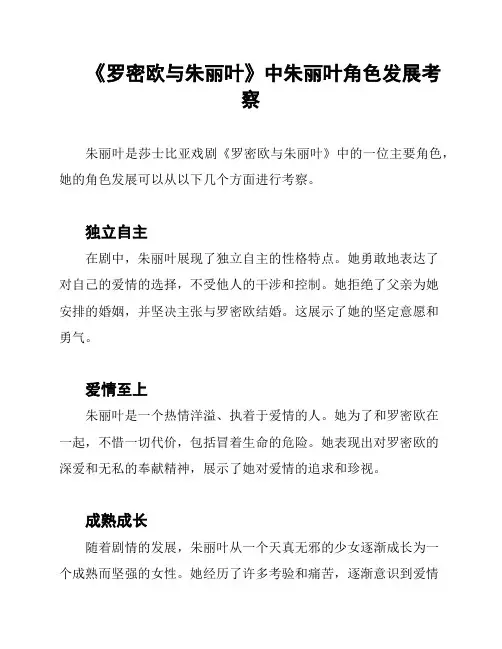
《罗密欧与朱丽叶》中朱丽叶角色发展考
察
朱丽叶是莎士比亚戏剧《罗密欧与朱丽叶》中的一位主要角色,她的角色发展可以从以下几个方面进行考察。
独立自主
在剧中,朱丽叶展现了独立自主的性格特点。
她勇敢地表达了
对自己的爱情的选择,不受他人的干涉和控制。
她拒绝了父亲为她
安排的婚姻,并坚决主张与罗密欧结婚。
这展示了她的坚定意愿和
勇气。
爱情至上
朱丽叶是一个热情洋溢、执着于爱情的人。
她为了和罗密欧在
一起,不惜一切代价,包括冒着生命的危险。
她表现出对罗密欧的
深爱和无私的奉献精神,展示了她对爱情的追求和珍视。
成熟成长
随着剧情的发展,朱丽叶从一个天真无邪的少女逐渐成长为一
个成熟而坚强的女性。
她经历了许多考验和痛苦,逐渐意识到爱情
并非一帆风顺。
她学会了处理复杂的情感和面对困难的挑战,展示了她的成熟和智慧。
牺牲与悲剧
最终,朱丽叶为了和罗密欧在一起,假装死亡,并最终选择了自杀。
尽管这是一个令人悲伤的结局,但她的牺牲表达了她对爱情的无尽追求。
她愿意为了爱情而放弃一切,包括自己的生命。
以上是《罗密欧与朱丽叶》中朱丽叶角色发展的一些考察点。
她的独立自主、爱情至上、成熟成长以及最终的牺牲与悲剧,都展示了她作为一个角色的丰富内涵和复杂情感。
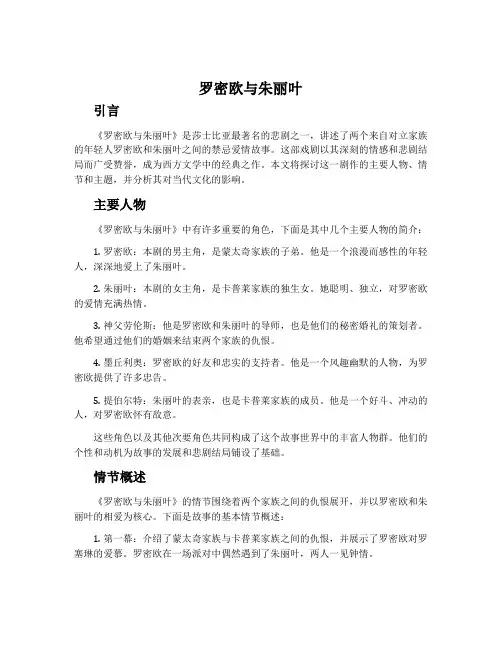
罗密欧与朱丽叶引言《罗密欧与朱丽叶》是莎士比亚最著名的悲剧之一,讲述了两个来自对立家族的年轻人罗密欧和朱丽叶之间的禁忌爱情故事。
这部戏剧以其深刻的情感和悲剧结局而广受赞誉,成为西方文学中的经典之作。
本文将探讨这一剧作的主要人物、情节和主题,并分析其对当代文化的影响。
主要人物《罗密欧与朱丽叶》中有许多重要的角色,下面是其中几个主要人物的简介:1.罗密欧:本剧的男主角,是蒙太奇家族的子弟。
他是一个浪漫而感性的年轻人,深深地爱上了朱丽叶。
2.朱丽叶:本剧的女主角,是卡普莱家族的独生女。
她聪明、独立,对罗密欧的爱情充满热情。
3.神父劳伦斯:他是罗密欧和朱丽叶的导师,也是他们的秘密婚礼的策划者。
他希望通过他们的婚姻来结束两个家族的仇恨。
4.墨丘利奥:罗密欧的好友和忠实的支持者。
他是一个风趣幽默的人物,为罗密欧提供了许多忠告。
5.提伯尔特:朱丽叶的表亲,也是卡普莱家族的成员。
他是一个好斗、冲动的人,对罗密欧怀有敌意。
这些角色以及其他次要角色共同构成了这个故事世界中的丰富人物群。
他们的个性和动机为故事的发展和悲剧结局铺设了基础。
情节概述《罗密欧与朱丽叶》的情节围绕着两个家族之间的仇恨展开,并以罗密欧和朱丽叶的相爱为核心。
下面是故事的基本情节概述:1.第一幕:介绍了蒙太奇家族与卡普莱家族之间的仇恨,并展示了罗密欧对罗塞琳的爱慕。
罗密欧在一场派对中偶然遇到了朱丽叶,两人一见钟情。
2.第二幕:罗密欧与朱丽叶在神父劳伦斯的女修道院秘密地结婚。
他们希望通过他们的婚姻来结束两个家族之间的仇恨。
3.第三幕:罗密欧与提伯尔特之间发生了一场激烈的决斗,并导致了提伯尔特的死亡。
罗密欧被判离开城市,朱丽叶则被迫与帕里丹结婚。
4.第四幕:为了逃避与帕里丹的婚姻,朱丽叶与劳伦斯的帮助下采取了一种伪装,假装自杀并长时间沉睡。
5.第五幕:罗密欧误以为朱丽叶已经死去,他喝下了毒药自杀。
朱丽叶醒来后发现罗密欧已经死去,她拿起一把匕首刺向自己的心脏,以和罗密欧在死亡中再次相会。
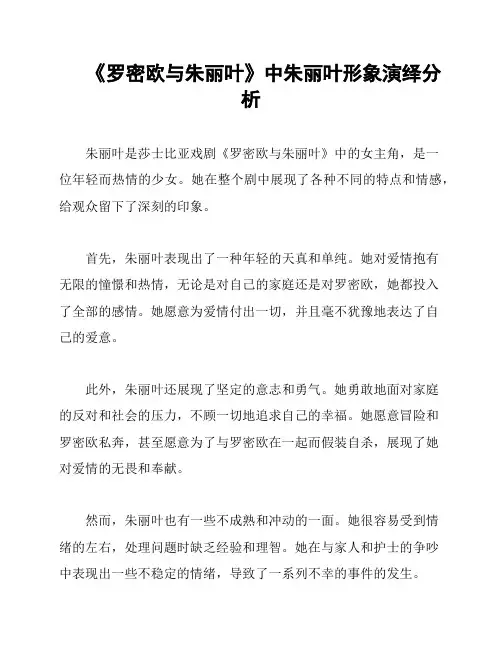
《罗密欧与朱丽叶》中朱丽叶形象演绎分
析
朱丽叶是莎士比亚戏剧《罗密欧与朱丽叶》中的女主角,是一
位年轻而热情的少女。
她在整个剧中展现了各种不同的特点和情感,给观众留下了深刻的印象。
首先,朱丽叶表现出了一种年轻的天真和单纯。
她对爱情抱有
无限的憧憬和热情,无论是对自己的家庭还是对罗密欧,她都投入
了全部的感情。
她愿意为爱情付出一切,并且毫不犹豫地表达了自
己的爱意。
此外,朱丽叶还展现了坚定的意志和勇气。
她勇敢地面对家庭
的反对和社会的压力,不顾一切地追求自己的幸福。
她愿意冒险和
罗密欧私奔,甚至愿意为了与罗密欧在一起而假装自杀,展现了她
对爱情的无畏和奉献。
然而,朱丽叶也有一些不成熟和冲动的一面。
她很容易受到情
绪的左右,处理问题时缺乏经验和理智。
她在与家人和护士的争吵
中表现出一些不稳定的情绪,导致了一系列不幸的事件的发生。
总的来说,朱丽叶是一个充满活力和激情的角色,她的形象在
整个剧中起着至关重要的作用。
她展现了年轻爱情的美好和坚定的
意志,但也暴露了不成熟和冲动的一面。
通过对朱丽叶形象的演绎,观众可以更好地理解人性的复杂性和爱情的力量。
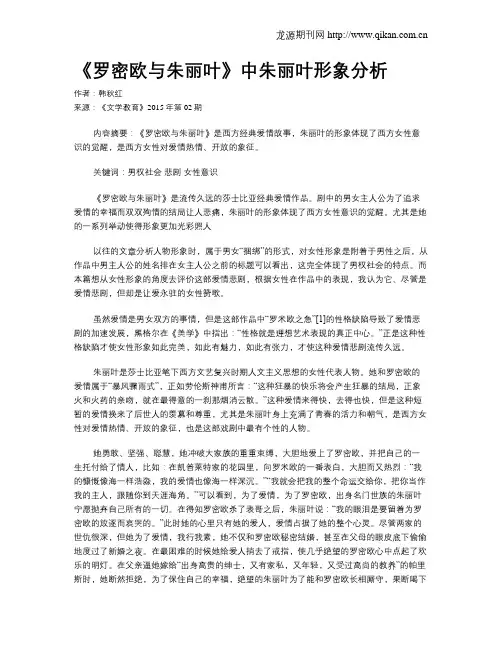
《罗密欧与朱丽叶》中朱丽叶形象分析作者:韩秋红来源:《文学教育》2015年第02期内容摘要:《罗密欧与朱丽叶》是西方经典爱情故事,朱丽叶的形象体现了西方女性意识的觉醒,是西方女性对爱情热情、开放的象征。
关键词:男权社会悲剧女性意识《罗密欧与朱丽叶》是流传久远的莎士比亚经典爱情作品。
剧中的男女主人公为了追求爱情的幸福而双双殉情的结局让人悲痛,朱丽叶的形象体现了西方女性意识的觉醒。
尤其是她的一系列举动使得形象更加光彩照人以往的文章分析人物形象时,属于男女“捆绑”的形式,对女性形象是附着于男性之后,从作品中男主人公的姓名排在女主人公之前的标题可以看出,这完全体现了男权社会的特点。
而本篇想从女性形象的角度去评价这部爱情悲剧,根据女性在作品中的表现,我认为它、尽管是爱情悲剧,但却是让爱永驻的女性赞歌。
虽然爱情是男女双方的事情,但是这部作品中“罗米欧之急”[1]的性格缺陷导致了爱情悲剧的加速发展,黑格尔在《美学》中指出:“性格就是理想艺术表现的真正中心。
”正是这种性格缺陷才使女性形象如此完美,如此有魅力,如此有张力,才使这种爱情悲剧流传久远。
朱丽叶是莎士比亚笔下西方文艺复兴时期人文主义思想的女性代表人物。
她和罗密欧的爱情属于“暴风骤雨式”,正如劳伦斯神甫所言:“这种狂暴的快乐将会产生狂暴的结局,正象火和火药的亲吻,就在最得意的一刹那烟消云散。
”这种爱情来得快,去得也快,但是这种短暂的爱情换来了后世人的羡慕和尊重,尤其是朱丽叶身上充满了青春的活力和朝气,是西方女性对爱情热情、开放的象征,也是这部戏剧中最有个性的人物。
她勇敢、坚强、聪慧,她冲破大家族的重重束缚,大胆地爱上了罗密欧,并把自己的一生托付给了情人,比如:在凯普莱特家的花园里,向罗米欧的一番表白,大胆而又热烈:“我的慷慨像海一样浩淼,我的爱情也像海一样深沉。
”“我就会把我的整个命运交给你,把你当作我的主人,跟随你到天涯海角。
”可以看到,为了爱情,为了罗密欧,出身名门世族的朱丽叶宁愿抛弃自己所有的一切。
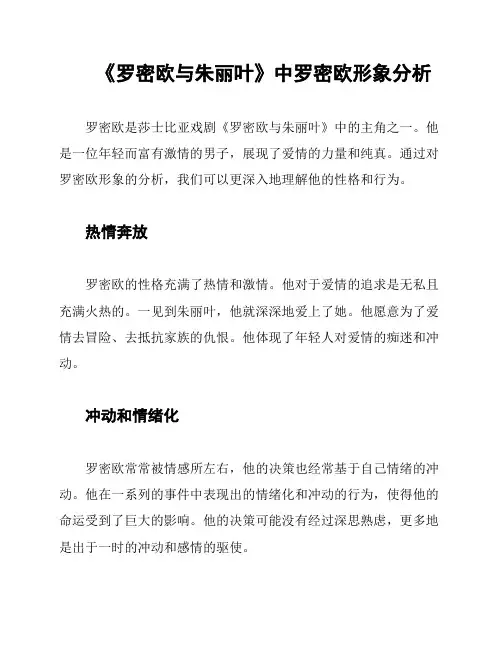
《罗密欧与朱丽叶》中罗密欧形象分析
罗密欧是莎士比亚戏剧《罗密欧与朱丽叶》中的主角之一。
他是一位年轻而富有激情的男子,展现了爱情的力量和纯真。
通过对罗密欧形象的分析,我们可以更深入地理解他的性格和行为。
热情奔放
罗密欧的性格充满了热情和激情。
他对于爱情的追求是无私且充满火热的。
一见到朱丽叶,他就深深地爱上了她。
他愿意为了爱情去冒险、去抵抗家族的仇恨。
他体现了年轻人对爱情的痴迷和冲动。
冲动和情绪化
罗密欧常常被情感所左右,他的决策也经常基于自己情绪的冲动。
他在一系列的事件中表现出的情绪化和冲动的行为,使得他的命运受到了巨大的影响。
他的决策可能没有经过深思熟虑,更多地是出于一时的冲动和感情的驱使。
勇敢而无畏
尽管罗密欧表现出冲动和情绪化的一面,但他也展示了勇敢和
无畏的品质。
他愿意冒险去追求自己的爱情,不惧怕家族的仇恨和
社会的压力。
他勇敢地面对了种种困难和危险,表现出不怕牺牲的
决心。
苦闷和忧伤
在戏剧的发展过程中,罗密欧经历了许多苦闷和忧伤。
他陷入
了家族的恩怨之中,最终导致了深深的悲剧。
他失去了自己的亲友,并将自己困在了绝境之中。
他的形象既展示了爱情的美好,也凸显
了痛苦和忧伤的一面。
总之,罗密欧是一个富有激情和追求爱情的年轻人。
他的形象
在戏剧中扮演着重要的角色,展示了爱情的力量和情感的激荡。
虽
然他的命运最终以悲剧告终,但他的形象仍然让人留下了深刻的印象。
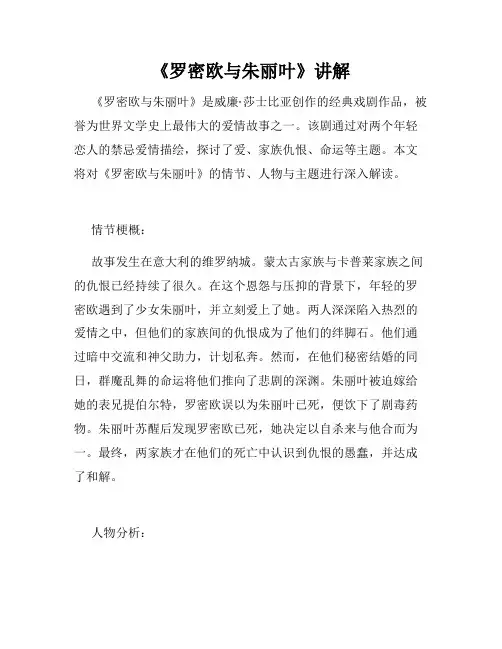
《罗密欧与朱丽叶》讲解《罗密欧与朱丽叶》是威廉·莎士比亚创作的经典戏剧作品,被誉为世界文学史上最伟大的爱情故事之一。
该剧通过对两个年轻恋人的禁忌爱情描绘,探讨了爱、家族仇恨、命运等主题。
本文将对《罗密欧与朱丽叶》的情节、人物与主题进行深入解读。
情节梗概:故事发生在意大利的维罗纳城。
蒙太古家族与卡普莱家族之间的仇恨已经持续了很久。
在这个恩怨与压抑的背景下,年轻的罗密欧遇到了少女朱丽叶,并立刻爱上了她。
两人深深陷入热烈的爱情之中,但他们的家族间的仇恨成为了他们的绊脚石。
他们通过暗中交流和神父助力,计划私奔。
然而,在他们秘密结婚的同日,群魔乱舞的命运将他们推向了悲剧的深渊。
朱丽叶被迫嫁给她的表兄提伯尔特,罗密欧误以为朱丽叶已死,便饮下了剧毒药物。
朱丽叶苏醒后发现罗密欧已死,她决定以自杀来与他合而为一。
最终,两家族才在他们的死亡中认识到仇恨的愚蠢,并达成了和解。
人物分析:1. 罗密欧(Romeo):憧憬爱情的年轻人,对朱丽叶一见钟情,并为她付出一切。
他的冲动和冒险精神使得他最终下了决定要与朱丽叶共同度过生命。
2. 朱丽叶(Juliet):对罗密欧的爱情充满热情,愿意为了与他在一起而放弃一切。
她的坚定和勇气彰显在她决定自杀与罗密欧永远在一起的时刻。
3. 神父劳伦斯(Friar Laurence):善良的神父,希望能够通过帮助罗密欧和朱丽叶结合来结束两家族的仇恨。
然而,他的计划最终导致了悲剧的发生。
4. 提伯尔特(Tybalt):朱丽叶的表兄,狂热、冲动的性格使得他成为主要的导火索。
在罗密欧和朱丽叶的婚礼上,他与罗密欧决斗,最终导致了两人的悲剧。
5. 卡普莱(Capulet)和蒙太古(Montague):朱丽叶与罗密欧所属的两个对立家族,他们的仇恨成为了两位恋人的阻碍。
主题分析:1. 爱情与激情:罗密欧与朱丽叶爱得无法自拔,他们激情澎湃的感情挑战了传统和权威,推翻了既定秩序。
2. 宿命与命运:《罗密欧与朱丽叶》常被称为“星十字宿命剧”,在剧中,命运起到了决定性的作用。
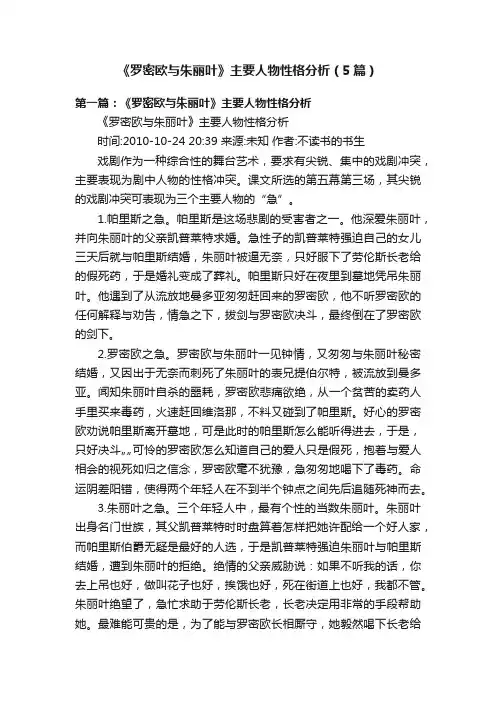
《罗密欧与朱丽叶》主要人物性格分析(5篇)第一篇:《罗密欧与朱丽叶》主要人物性格分析《罗密欧与朱丽叶》主要人物性格分析时间:2010-10-24 20:39 来源:未知作者:不读书的书生戏剧作为一种综合性的舞台艺术,要求有尖锐、集中的戏剧冲突,主要表现为剧中人物的性格冲突。
课文所选的第五幕第三场,其尖锐的戏剧冲突可表现为三个主要人物的“急”。
1.帕里斯之急。
帕里斯是这场悲剧的受害者之一。
他深爱朱丽叶,并向朱丽叶的父亲凯普莱特求婚。
急性子的凯普莱特强迫自己的女儿三天后就与帕里斯结婚,朱丽叶被逼无奈,只好服下了劳伦斯长老给的假死药,于是婚礼变成了葬礼。
帕里斯只好在夜里到墓地凭吊朱丽叶。
他遇到了从流放地曼多亚匆匆赶回来的罗密欧,他不听罗密欧的任何解释与劝告,情急之下,拔剑与罗密欧决斗,最终倒在了罗密欧的剑下。
2.罗密欧之急。
罗密欧与朱丽叶一见钟情,又匆匆与朱丽叶秘密结婚,又因出于无奈而刺死了朱丽叶的表兄提伯尔特,被流放到曼多亚。
闻知朱丽叶自杀的噩耗,罗密欧悲痛欲绝,从一个贫苦的卖药人手里买来毒药,火速赶回维洛那,不料又碰到了帕里斯。
好心的罗密欧劝说帕里斯离开墓地,可是此时的帕里斯怎么能听得进去,于是,只好决斗……可怜的罗密欧怎么知道自己的爱人只是假死,抱着与爱人相会的视死如归之信念,罗密欧毫不犹豫,急匆匆地喝下了毒药。
命运阴差阳错,使得两个年轻人在不到半个钟点之间先后追随死神而去。
3.朱丽叶之急。
三个年轻人中,最有个性的当数朱丽叶。
朱丽叶出身名门世族,其父凯普莱特时时盘算着怎样把她许配给一个好人家,而帕里斯伯爵无疑是最好的人选,于是凯普莱特强迫朱丽叶与帕里斯结婚,遭到朱丽叶的拒绝。
绝情的父亲威胁说:如果不听我的话,你去上吊也好,做叫花子也好,挨饿也好,死在街道上也好,我都不管。
朱丽叶绝望了,急忙求助于劳伦斯长老,长老决定用非常的手段帮助她。
最难能可贵的是,为了能与罗密欧长相厮守,她毅然喝下长老给的假死药,并且躺到自己家的墓穴,与死者为伍。
大学本科毕业论文题目:Analysis on Characteristics of Characters in Romeo and Juliet and Marriage V iew of Feudal Families院系:专业:班级:学生姓名:指导教师:摘要《罗密欧与朱丽叶》是莎士比亚著名的爱情悲剧之一。
罗密欧与朱丽叶这一对恋人相亲相爱,他们忠于自己的爱情,忠于自己的誓言。
他们为了获得幸福,不顾任何冷酷的现实,最后他们双双殉情自杀。
莎士比亚正是通过罗密欧和朱丽叶的爱情悲剧,把爱情题材和文艺复兴时期的社会矛盾联系起来,批判了封建道德观念,表现了人文主义追求个人自由和个人幸福的理念。
本文通过分析《罗密欧与朱丽叶》的人物性格特点及及其家庭来揭露在社会主义宗教改革和人文主义思想下的人物性格特点及封建家庭中的婚姻观。
关键词:《罗密欧与朱丽叶》,人物性格,婚姻观ABSTRACTRomeo and Juliet is one of the famous love tragedies of Shakespeare. As a couple, Romeo and Juliet who were deeply attached to each other were loyal to their love and faithful to their oath. In order to obtain happiness, they were regardless of any cold reality, and finally the lovers committed suicide together for love. Shakespeare correlated the subject matter works of love with social contradictions in the Renaissance period through the love tragedy Romeo and Juliet, criticized the feudal moral concept and expressed that the humanism aims at pursuing concepts of personal freedom and personal happiness. This paper will analyze characters and families in Romeo and Juliet to expose the characteristics of characters and marriage view of feudal families under the influence of socialist religious reform and humanistic ideas.Key word: Romeo and Juliet, characters, marriage viewContentChapter I Introduction............................................................................................1.1The Author.....................................................................................................1.2The Background............................................................................................1.3Literature Review.......................................................................................... Chapter II Characteristics of Characters in Romeo and Juliet................................2.1 Main Plots of Romeo and Juliet....................................................................2.2 Characteristics of Juliet.................................................................................2.3 Characteristics of Romeo..............................................................................2.4 Discussion on Characteristics of Romeo and Juliet....................................... Chapter III Feudal Families in Romeo and Juliet....................................................3.1 Feudal Capulet Family..................................................................….............3.1.1 Capulet..................................................................…...........................3.1.2 Capulet’s wife..................................................................…................3.2 Feudal Montague Family...............................................................................3.2.1 Montague..................................................................….......................3.2.2 Montague’s wife..................................................................….............3.3 Marriage View of Feudal Montague Families............................................... Chapter IV Conclusion............................................................................................ Bibliography.............................................................................................................论《罗密欧与朱丽叶》的人物性格特点及封建家庭中的婚姻观Analysis on Characteristics of Characters in Romeo and Juliet and Marriage View of Feudal FamiliesChapter I IntroductionLove is the eternal theme in literature. Up to the present, it is unknown that so many people pour out their soul. They sing a lot of love-paeans with vehement passions. Although we wish that the lovers have a happy wedding, there are still some tragic love-stories in literature.1.1 The AuthorWilliam Shakespeare (1564-1615) was an English dramatist and poet and generally regarded as the greatest writer in the English language. He wrote 37 plays and 154 sonnets in his lifetime. His imagination, his richness of language and his deep understanding of human behaviors had made him universally known and loved. His influence on English literature and on the writers of other countries is immense. Shakespeare is one of the founders of realism in world literature. His dramatic creation often used the method of adaptations. His long experience with the stage and his intimate knowledge of dramatic art thus acquired make him a master hand for playwriting. He was a great master of the English language. He was skilled in manypoetic forms: the song, the sonnet, the couple, and the dramatic blank verse.1.2 The BackgroundShakespeare was living during the renaissance period. The English renaissance was largely literary and achieved its height during the Elizabethan period. The age was especially significant for three literary forms: the drama, poetry and prose. Most of the writers in the era of the renaissance were sometimes called humanists. In Shakespeare’s works voiced the human aspiration for freedom and equality and against the feudal rule. Living in the historical period of the transition from feudalism to capitalism, Shakespeare faithfully and vividly reflected the society through a host of typical characters in his plays.1.3 L iterature ReviewRomeo and Juliet is Shakespeare’s earliest great success in tragedy, which combines a tragic situation with comedy and gaiety. The play is an exposure of the old feudal world with its internal strife and its unnatural human relations. Though the two innocent lovers die in the end, the play has nothing of pessimism in it. The balcony scene and the parting scene are two great love scenes in the world's literature. This play has always remained a favorite with young readers and audience. The text of Romeo and Juliet in the Oxford copy of the First Folio was almost thumbed to pieces by eager students of the seventeenth century.Shakespeare’s works are chiefly concerned with the affairs of youth and full of romantic sentiment.Romeo and Juliet is lyrical and optimistic in spirit, lit up by the spring and sunshine of South Europe, it shows an extraordinary facility in expression and a felicity in the choice of phrases, shows an increasing insight into characters and mind, and finally gained a good command of characterization.Chapter II Characteristics of Characters in Romeo and Juliet2.1 Main Plots of Romeo and JulietRomeo and Juliet took place in V erona city. There were two huge family groups, the Montague family and the Capulet family. They aroused a series of new struggles. However, they gave birth to a pair of unfortunate lovers.“She is the pearl of the sky to land the world!” Romeo described Juliet like this. They fell in love with each other deeply at the first sight. In the garden, with the moonlight, they expressed their love. They got marry secretly. It seemed that it was the line that the situation would turn around. No one would have thought that after a few hours they would depart. Romeo was to be banished because he killed Juliet’s cousin who killed Romeo’s good friend. Juliet was in great sorrow. Misfortunes never come singly. Juliet was forced to marry another one. That night Romeo secretly climbed Juliet’s room. It seemed to be a farewell. He had to leave in the morning. It was never hoped the arrival of the dawn. Before got marry Juliet took the sleeping death medicine following the advice of a priest named Friar Lawrence who sent a letter to Romeo to tell the fact. However Romeo didn’t receive the message. With grief and madness, with poison, he came to the tomb. Because he thought Juliet had already dead he took the poison. Just at this moment Juliet woke up. Juliet found her husband’s death and suicided at once. When the priest Friar Lawrence told their loving story to their family members the tow families finally broke their barriers. They turned their conflicts and hatred into friendship. A golden status was set to memory their great love.2.2 Characteristics of JulietAs a younger child, she was cared for by a Nurse who is now her confidante. Juliet is approaching her 14th birthday (her 16th in Arthur Brooke's poem). She was born on "Lammas Eve at night" (August 1), so Juliet's birthday is July 31. Her birthday is "a fortnight hence", putting the action of the play in mid-July.Shakespeare's Juliet was very young; her father states that she "hath not seen the change of fourteen years". The sacred lovers are reunited on the same deathbed. Both their families realized what they had done by trying to separate the star crossed loverswith the effect that the Capulets and Montagues are reunited and their fighting ended. She dies at the end of the play.2.2 Characteristics of RomeoIn the beginning of the play, Romeo pined for an unrequited love, Rosaline. To cheer him up, his friends Benvolio and Mercutio took him to the Capulets' celebration in disguise, where he met and fell in love with the Capulets' only daughter, Juliet. Later that night, he met Juliet secretly and pledged to marry, despite their families' long-standing feud. They married the following day, but their union was soon thrown into chaos by their families; Juliet's cousin Tybalt dueled and killed Romeo's friend Mercutio that threw Romeo into such a rage that he killed Tybalt, and the Prince of Verona subsequently banished him. Meanwhile, Juliet's father planned to marry her off to Paris, a local aristocrat, within the next few days, threatening to turn her out on the streets if she did n’t follow through. Desperate, Juliet begged Romeo's confidant, Friar Laurence to help her to escape the forced marriage. Laurence did so by giving her a potion that put her in a death-like coma. The plan worked, but too soon for Romeo to learn of it; he genuinely believed Juliet to be dead, and so resolved to commit suicide. Romeo's final words were "Thus with a kiss I die". He killed himself at Juliet's grave, moments before she awaked; she killed herself in turn shortly thereafter.2.3 Discussion on Characteristics of Romeo and JulietTrue love gives the hero and courage to pursue the free love. Although Juliet knew that Romeo was from her enemy’s son. She cannot help resisting her love to Romeo. It was love that gave their courage to fight against feudalism. Juliet gave up the narrow clan concepts and maintained her love to Romeo. Love gave their loyalty. They chose death to show their faithful love to their lovers. When Romeo knew Juliet dead he drank poison and dead in Juliet’s tomb. It was all the same with Juliet. Before their suicide their monologues were extremely similar as their last sentences. Juliet said: “I did the cup for you!” Romeo said: “to my love, I did the cup!” Their lovenever ended by the boundary of their hatred. With the true love they never mind ending their precious lives.Y et we can look into the play carefully and we may try to find out to what its elements help to elucidate the question of love. The evaluation to which one will be led after interpreting the treatment of love in Romeo and Juliet depends on the aspect on which the investigation focuses: if, for example, the deeds of Romeo and Juliet, their errors and responsibility are regarded as the crucial point of the question, the investigation will probably show that Romeo is not the perfect and ideal lover, but a vain, partly inconstant, inexperienced young man, whose overhasty love to Juliet, as well inexperienced, leads to the death of both. But if the incredible coincidences and misunderstandings in the play are the focus of attention, the corresponding assessment of love will lay emphasis on the power of fate and fortune against the good intentions and the refined feelings of the two young lovers.Chapter III Feudal Families in Romeo and JulietAt first sight Romeo and Juliet may seem to be a simple, domestic romance. It has been moving the audiences of more than three centuries and has been the source for many adaptations. It is one of the most widely known works of Shakespeare and shares a large popularity up to today. But beyond this tragic and romantic love-story, which uncountable people have simply enjoyed on stage or screen, there could be more: a didactic message, a hidden social criticism or some elaborated concepts. Obviously, one of the central subjects dealt with in Romeo and Juliet is the subject of love.3.1 Feudal Capulet FamilyThe name of the Capulet family (in Italian, the Capuleti) was an actual political faction of the 13th century3.1.1 CapuletCapulet is the patriarch of the Capulet family, the father of Juliet, and uncle of Tybalt. He is very wealthy, but he is not an aristocrat; that is, it would be incorrect to refer to him as "Lord Capulet". He is sometimes commanding but also convivial, as at the ball.Capulet believed he knew what was best for Juliet. He said that his consent to the marriage depended upon what she wanted and told Paris that if he wanted to marry her he should wait a while then ask her. When she refused to become Paris's "joyful bride", saying that she can "never be proud of what she hates", he became furious, threatening to make her a street urchin, calling her "hilding" (meaning "slut" or "whore"), "unworthy", "young baggage" and "disobedient wretch" (along with "green-sickness carrion" and "tallow-face"), but sentenced her to rotting away in prison if she did not obey her parents' orders). His actions indicated that his daughter's wants were irrelevant all the way up to the point when he saw her unconscious on her bed (presumably dead) and later when she was truly dead during the play's final scene.3.1.2 Capulet's wifeCapulet's wife was the matriarch of the house of Capulet, and Juliet's mother. She played a larger role than Montague's wife, appearing in several scenes. In Act One, Scene three, she refused to talk to her daughter about marriage, as she felt uncomfortable about it, but she was pleased about Count Paris's "interest" in her daughter. When Tybalt was killed in Act Three, she expressed extreme grief and a strong desire for revenge on Romeo. By the final act, she was nearly overcome by the tragic events of the play. We know that Juliet was born when her mother was 14, thus she is about 28 years old, and her husband was many years older than her. Calling her "Lady Capulet" was a modern convention; it is an echo of Juliet's form of address in 3.5.65: "my lady mother". In the first quartos the stage direction and speech headings can be "mother", "wife", or even "old lady", but nowhere "Lady Capulet".3.2 Feudal Montague FamilyThe Montague family (in Italian, the Montecchi) was an actual political faction of the 13th century.3.2.1 MontagueOld Montague was the patriarch of the house of Montague, and the father of Romeo and uncle to Benvolio. He was very wealthy, but he was not an aristocrat; that was, it would be incorrect to refer to him as "Lord Montague". He worried over Romeo's relationship with Rosaline (with whom Romeo was in love at the beginning of the story), but cannot get through to his son. He later pleaded with the Prince to prevent his son from being executed, and got his wish when the Prince lowered Romeo's punishment to banishment. In the earliest texts his name was actually spelled "Mountague", but Montague now seems well-established.3.2.2 Montague's wifeMontague's wife was the matriarch of the house of Montague, and the mother of Romeo and aunt of Benvolio. She appeared twice within the play: in act one, scene one she first restrained Montague from entering the quarrel himself, and later spoke with Benvolio about the same quarrel. She returned with her husband and the Prince in act three, scene one to see what the trouble was informed of Romeo's banishment. She died of grief offstage soon after (mentioned in act five). She was very protective of her son Romeo and was very happy when Benvolio told her that Romeo was not involved in the brawl that happened between the Capulets and Montagues. When Romeo was banished his mother was heartbroken and then she died. As with Capulet's wife, calling her "Lady Montague" is a later invention not supported by the earliest texts.3.3 Marriage View of Feudal Montague FamiliesThe actions of the Romeo and Juliet and resistance against their family marriage reflected deeply distinct anti-feudal tendency. In the work of Romeo and Juliet,we can not only see the reflection of the renaissance period, also can experience the emotion and attitude of the feudal families. At that time, , new bourgeoisie in the Europe continued to rise, but the feudal forces was still in clinging to dominant position, Romeo and Juliet were deeply in love, for free love, they greatly conflicted with feudal patriarchal system. Obviously, this is conflict and contradiction of the new bourgeoisie and the feudal forces. So to speak, Romeo and Juliet were the typical representatives of the new bourgeoisie, they were rich in youthful vitality, they had purer love in the world, in order to free love and regardless of the results of the love and family hatred, they fought against the feudal patriarchal system for their love, this is marriage view of Romeo and Juliet. The humanism young people, the tragedy of the love story of Romeo and Juliet was blamed on feudal old consciousness, the love theme was connected with social contradictions in renaissance period, the criticism is directed to aged and barbarous moral principles in the middle ages and pointed to the reality of the feudal forces. In the end of the works of Shakespeare, the personal views on marriage makes the light of love dissolve hatred of two families and consequently makes the work shine with youth and vigor constantly.The humanism spirit in 14-16 centuries of European was a rising period of life view, value and marriage view of the new bourgeoisie. Viewing in the day, there are many time limitations naturally. But it took human as subjectivity, demanding core ideas of respecting on nature and value and was not obsolete in nowadays. At present, even through the humanistic spirit lost greatly, Romeo and Juliet still have spirit nutrition which we need to learn.Chapter IV ConclusionThe power of love is so great that beyond our thinking. Nothing can divide the lovers. Although the society not allowed free loving, with true love, people would never retreat. Just like the hero and the heroin they never stopped struggling with the feudal emotion and arranged marriage. They represented the new opinions about love. To some degree they were more individual about their private thinking. If they fell in love with each other they would throw all the prejudice. Even they were not accepted by others or by the wild society; they still followed love and never mind ending their lives. Love is innocent. No matter how hard the reality is, love is always the most powerful thing to make you life significant.The true love and the reality exist at the same time in the drama of Romeo and Juliet. The drama reflects the characteristics of William Shakespeare’s period. Romeo and Juliet’s love is full of renaissance humanists of romantic emotional appeal.Bibliography1. Gray, Zachary (1754). Critical, historical, and explanatory notes on Shakespeare. London: Richard Manby. Page 265.2. Somogyi, Nick (2001). Twelfth Night. London: Nick Hern Books. p. 160. ISBN 1 85459 622 5.3. Moore, Olin H. (July 1930). "The Origins of the Legend of Romeo and Juliet in Italy". Speculum (Medieval Academy of America) 5 (3): 264–277.4. Meagher, John C. (2003)., NJ: Fairleigh Dickinson University Press. Page 81. ISBN 0-8386-3993-3.5. Halio, Jay. Romeo and Juliet. Westport: Greenwood Press, 1998. Page. 16. Bevington, David M. How to read a Shakespeare play. Malden, MA: Blackwell. Page 44–45.7. Shakespeare. Romeo and Juliet.8. Hager, Alan. Understanding Romeo and Juliet. Westport: Greenwood Press, 1999. Page 17-20.9. The Complete Works of William Shakespeare - The Tragedy of Romeo and Juliet", Project Gutenberg10. Walpole, V. "The Plague in 'Romeo and Juliet'. " The Modern Language Review. (April, 1928) 23. Page 213-215.。
爱情与宿命的较量——《罗密欧与朱丽叶》的人物分析1. 引言1.1 概述:《罗密欧与朱丽叶》是英国文学史上最为著名的戏剧之一,由威廉·莎士比亚创作。
这部戏剧以爱情和宿命为主题,描绘了两位年轻人在家族仇恨和宿命限制下艰难追求爱情的故事。
这个故事不仅表达了深刻的真爱追求和人性的复杂性,同时也探讨了命运对于个体选择和决定的影响。
1.2 文章结构:本文将从不同角度分析《罗密欧与朱丽叶》中的人物形象以及爱情和宿命之间的较量。
首先,我们将定义爱情和宿命,并揭示在该剧中二者之间冲突产生的原因。
然后,我们将详细分析主角罗密欧和朱丽叶的性格特点以及他们对爱情的影响。
接着,我们将探讨他们所面临的宿命限制和冲突,并考察他们对于悲剧命运和追求爱情时所展现出来的坚持与挣扎。
最后,我们将就整个故事的结局作出评价,并探讨等价交换是否存在于爱情和宿命之间。
最后,我们将总结读者从该剧中得到的信息,并对人物分析和主题探讨进行总结。
1.3 目的:本文旨在通过对《罗密欧与朱丽叶》中爱情与宿命的较量以及主角罗密欧和朱丽叶的人物分析,探索莎士比亚在这一经典作品中所传达的深刻思考。
同时,我们也希望读者通过阅读本文能够更好地理解莎士比亚戏剧中所蕴含的智慧和人性哲学。
通过深入研究这部作品,我们可以更好地了解爱情与宿命之间的关系,以及个体在面对限制时勇往直前追求自己信念的坚韧意志。
2. 爱情与宿命之间的对立2.1 定义爱情与宿命爱情是一种强烈的情感体验,通常指的是两个人之间深厚的感情,并表现出关注、互助和奉献。
在小说《罗密欧与朱丽叶》中,爱情是主要的动力和核心主题之一。
宿命是指超越个体意愿和控制力的力量或因素,决定了一个人的命运或境遇。
在该小说中,宿命被视为一个无法逃脱或改变的力量,以至于主角们面临着无法克服的限制和冲突。
2.2 揭示《罗密欧与朱丽叶》中爱情冲突的因素在《罗密欧与朱丽叶》中,爱情与宿命之间存在着明显的对立。
作者通过以下因素揭示了这种对立:首先,社会禁忌:蒙太古家族和卡普莱特家族长期存在仇恨和敌对关系。
论罗密欧与朱丽叶的人物性格特点及封建家庭中的婚姻观WTD standardization office【WTD 5AB- WTDK 08- WTD 2C】大学本科毕业论文题目: Analysis on Characteristics of Characters in Romeo and Juliet and Marriage View of Feudal Families院系:专业:班级:学生姓名:指导教师:摘要《罗密欧与朱丽叶》是莎士比亚着名的爱情悲剧之一。
罗密欧与朱丽叶这一对恋人相亲相爱,他们忠于自己的爱情,忠于自己的誓言。
他们为了获得幸福,不顾任何冷酷的现实,最后他们双双殉情自杀。
莎士比亚正是通过罗密欧和朱丽叶的爱情悲剧,把爱情题材和文艺复兴时期的社会矛盾联系起来,批判了封建道德观念,表现了人文主义追求个人自由和个人幸福的理念。
本文通过分析《罗密欧与朱丽叶》的人物性格特点及及其家庭来揭露在社会主义宗教改革和人文主义思想下的人物性格特点及封建家庭中的婚姻观。
关键词:《罗密欧与朱丽叶》,人物性格,婚姻观ABSTRACTRomeo and Juliet is one of the famous love tragedies of Shakespeare. As a couple, Romeo and Juliet who were deeply attached to each other were loyal to their love and faithful to their oath. In order to obtain happiness, they were regardless of any cold reality, and finally the lovers committed suicide together for love. Shakespeare correlated the subject matter works of love with social contradictions in the Renaissance period through the love tragedy Romeo and Juliet, criticized the feudal moral concept and expressed that the humanism aims at pursuing concepts of personal freedom and personal happiness. This paper will analyze characters and families in Romeo and Juliet to expose the characteristics of characters and marriage view of feudal families under the influence of socialist religious reform and humanistic ideas.Key word: Romeo and Juliet, characters, marriage viewContentChapter I Introduction............................................................................................1.1The Author.....................................................................................................1.2The Background............................................................................................1.3Literature Review..........................................................................................Chapter II Characteristics of Characters in Romeo and Juliet................................Main Plots of Romeo and Juliet....................................................................Characteristics of Juliet.................................................................................Characteristics of Romeo..............................................................................Discussion on Characteristics of Romeo and Juliet.......................................Chapter III Feudal Families in Romeo and Juliet....................................................Feudal Capulet Family..................................................................….............Capulet..................................................................…...........................Capulet’s wife..................................................................…................Feudal Montague Family...............................................................................Montague..................................................................….......................Montague’s wife..................................................................….............Marriage View of Feudal Montague Families...............................................Chapter IV Conclusion............................................................................................ Bibliography.............................................................................................................论《罗密欧与朱丽叶》的人物性格特点及封建家庭中的婚姻观Analysis on Characteristics of Characters in Romeo and Juliet and Marriage View of Feudal FamiliesChapter I IntroductionLove is the eternal theme in literature. Up to the present, it is unknown that so many people pour out their soul. They sing a lot of love-paeans with vehement passions. Although we wish that the lovers have a happy wedding, there are still some tragic love-stories in literature.The AuthorWilliam Shakespeare (1564-1615) was an English dramatist and poet and generally regarded as the greatest writer in the English language. He wrote 37 plays and 154 sonnets in his lifetime. His imagination, his richness of language and his deep understanding of human behaviors had made him universally known and loved. His influence on English literature and on the writers of other countries is immense. Shakespeare is one of the founders of realism in world literature. His dramatic creation often used the method of adaptations. His long experience with the stage and his intimate knowledge of dramatic art thus acquired make him a master hand for playwriting. He was a great master of the English language. He was skilled in many poetic forms: the song, the sonnet, the couple, and the dramatic blank verse.The BackgroundShakespeare was living during the renaissance period. The English renaissance was largely literary and achieved its height during the Elizabethan period. The age was especially significant for three literary forms: the drama, poetry and prose. Most of the writers in the era of the renaissance were som etimes called humanists. In Shakespeare’s works voiced the human aspiration for freedom and equality and against the feudal rule. Living in the historicalperiod of the transition from feudalism to capitalism, Shakespeare faithfully and vividly reflected the society through a host of typical characters in his plays.Literature ReviewRomeo and Juliet is Shakespeare’s earliest great success in tragedy, which combines a tragic situation with comedy and gaiety. The play is an exposure of the old feudal world with its internal strife and its unnatural human relations. Though the two innocent lovers die in the end, the play has nothing of pessimism in it. The balcony scene and the parting scene are two great love scenes in the world's literature. This play has always remained a favorite with young readers and audience. The text of Romeo and Juliet in the Oxford copy of the First Folio was almost thumbed to pieces by eager students of the seventeenth century.Shakespeare’s works are chiefly concerned with the affairs of youth and full of romantic sentiment.Romeo and Juliet is lyrical and optimistic in spirit, lit up by the spring and sunshine of South Europe, it shows an extraordinary facility in expression and a felicity in the choice of phrases, shows an increasing insight into characters and mind, and finally gained a good command of characterization.Chapter II Characteristics of Characters in Romeo and JulietMain Plots of Romeo and JulietRomeo and Juliet took place in Verona city. There were two huge family groups, the Montague family and the Capulet family. They aroused a series of new struggles. However, they gave birth to a pair of unfortunate lovers.“She is the pearl of the sky to land the world!” Romeo described Juliet like this. They fell in love with each other deeply at the first sight. In the garden, with the moonlight, they expressed their love. They got marry secretly. It seemed that it was the line that the situation would turn around. No one would have thought that after a few hours they would depart. Romeo was to be banished because he killed Juliet’s cousin who killed Romeo’s good friend. Juliet was in great sorrow. Misfortunes never come singly. Juliet was forced to marry another one. That night Romeo secretly climbed Juliet’s room. It seemed to be a farewell. He had to leave in the morning. It was never hoped the arrival of the dawn. Before got marry Juliet tookthe sleeping death medicine following the advice of a priest named Friar Lawrence who sent a letter to Romeo to tell the fact. However Romeo didn’t receive the message. With grief and madness, with poison, he came to the tomb. Because he thought Juliet had already dead he took the poison. Just at this moment Juliet woke up. Juliet found her husband’s death and suicided at once. When the priest Friar Lawrence told their loving story to their family members the tow families finally broke their barriers. They turned their conflicts and hatred into friendship. A golden status was set to memory their great love.Characteristics of JulietAs a younger child, she was cared for by a Nurse who is now her confidante. Juliet is approaching her 14th birthday (her 16th in Arthur Brooke's poem). She was born on "Lammas Eve at night" (August 1), so Juliet's birthday is July 31. Her birthday is "a fortnight hence", putting the action of the play in mid-July.Shakespeare's Juliet was very young; her father states that she "hath not seen the change of fourteen years". The sacred lovers are reunited on the same deathbed. Both their families realized what they had done by trying to separate the star crossed lovers with the effect that the Capulets and Montagues are reunited and their fighting ended. She dies at the end of the play.Characteristics of RomeoIn the beginning of the play, Romeo pined for an unrequited love, Rosaline. To cheer him up, his friends Benvolio and Mercutio took him to the Capulets' celebration in disguise, where he met and fell in love with the Capulets' only daughter, Juliet. Later that night, he met Juliet secretly and pledged to marry, despite their families' long-standing feud. They married the following day, but their union was soon thrown into chaos by their families; Juliet's cousin Tybalt dueled and killed Romeo's friend Mercutio that threw Romeo into such a rage that he killed Tybalt, and the Prince of Verona subsequently banished him. Meanwhile, Juliet's father planned to marry her off to Paris, a local aristocrat, within the next few days, threatening to turn her out on the streets if she did n’t follow through. Desperate, Julietbegged Romeo's confidant, Friar Laurence to help her to escape the forced marriage. Laurence did so by giving her a potion that put her in a death-like coma. The plan worked, but too soon for Romeo to learn of it; he genuinely believed Juliet to be dead, and so resolved to commit suicide. Romeo's final words were "Thus with a kiss I die". He killed himself at Juliet's grave, moments before she awaked; she killed herself in turn shortly thereafter.Discussion on Characteristics of Romeo and JulietTrue love gives the hero and courage to pursue the free love. Although Juliet knew that Romeo was from her enemy’s son. She cannot help resisting her love to Romeo. It was love that gave their courage to fight against feudalism. Juliet gave up the narrow clan concepts and maintained her love to Romeo. Love gave their loyalty. They chose death to show their faithful love to their lovers. When Romeo knew Juliet dead he drank poison and dead in Juliet’s tomb. It was all the same with Juliet. Before their suicide their monologues were extremely similar as their last sentences. Juliet said: “I did the cup for you!” Romeo said: “to my love, I did the cup!” Their love never ended by the boundary of their hatred. With the true love they never mind ending their precious lives.Yet we can look into the play carefully and we may try to find out to what its elements help to elucidate the question of love. The evaluation to which one will be led after interpreting the treatment of love in Romeo and Juliet depends on the aspect on which the investigation focuses: if, for example, the deeds of Romeo and Juliet, their errors and responsibility are regarded as the crucial point of the question, the investigation will probably show that Romeo is not the perfect and ideal lover, but a vain, partly inconstant, inexperienced young man, whose overhasty love to Juliet, as well inexperienced, leads to the death of both. But if the incredible coincidences and misunderstandings in the play are the focus of attention, the corresponding assessment of love will lay emphasis on the power of fate and fortune against the good intentions and the refined feelings of the two young lovers.Chapter III Feudal Families in Romeo and JulietAt first sight Romeo and Juliet may seem to be a simple, domestic romance. It has been moving the audiences of more than three centuries and has been the source for manyadaptations. It is one of the most widely known works of Shakespeare and shares a large popularity up to today. But beyond this tragic and romantic love-story, which uncountable people have simply enjoyed on stage or screen, there could be more: a didactic message, a hidden social criticism or some elaborated concepts. Obviously, one of the central subjects dealt with in Romeo and Juliet is the subject of love.Feudal Capulet FamilyThe name of the Capulet family (in Italian, the Capuleti) was an actual political faction of the 13th centuryCapuletCapulet is the patriarch of the Capulet family, the father of Juliet, and uncle of Tybalt. He is very wealthy, but he is not an aristocrat; that is, it would be incorrect to refer to him as "Lord Capulet". He is sometimes commanding but also convivial, as at the ball.Capulet believed he knew what was best for Juliet. He said that his consent to the marriage depended upon what she wanted and told that if he wanted to marry her he should wait a while then ask her. When she refused to become Paris's "joyful bride", saying that she can "never be proud of what she hates", he became furious, threatening to make her a , calling her "hilding" (meaning "slut" or "whore"), "unworthy", "young " and "disobedient wretch" (along with "green-sickness carrion" and "tallow-face"), but sentenced her to rotting away in if she did not obey her parents' orders). His actions indicated that his daughter's wants were irrelevant all the way up to the point when he saw her unconscious on her bed (presumably dead) and later when she was truly dead during the play's final scene.Capulet's wifeCapulet's wife was the matriarch of the house of Capulet, and Juliet's mother. She played a larger role than Montague's wife, appearing in several scenes. In Act One, Scene three, she refused to talk to her daughter about marriage, as she felt uncomfortable about it, but she was pleased about 's "interest" in her daughter. When Tybalt was killed in Act Three,she expressed extreme grief and a strong desire for revenge on Romeo. By the final act, she was nearly overcome by the tragic events of the play. We know that Juliet was born when her mother was 14, thus she is about 28 years old, and her husband was many years older than her. Calling her "Lady Capulet" wa the stage direction and speech headings can be "mother", "wife", or even "old lady", but nowhere "Lady Capulet".Feudal Montague FamilyThe Montague family (in Italian, the ) was an actual faction of the 13th century.MontagueOld Montague was the patriarch of the house of Montague, and the father of Romeo and uncle to Benvolio. He was very wealthy, but he was not an aristocrat; that was, it would be incorrect to refer to him as "Lord Montague". He worried over Romeo's relationship with Rosaline (with whom Romeo was in love at the beginning of the story), but cannot get through to his son. He later pleaded with the Prince to prevent his son from being executed, and got his wish when the Prince lowered Romeo's punishment to banishment. In the earliest texts his name was actually spelled "Mountague", but Montague now seems well-established.Montague's wifeMontague's wife was the matriarch of the house of Montague, and the mother of Romeo and aunt of Benvolio. She appeared twice within the play: in act one, scene one she first restrained Montague from entering the quarrel himself, and later spoke with Benvolio about the same quarrel. She returned with her husband and the Prince in act three, scene one to see what the trouble was informed of Romeo's banishment. She died of grief offstage soon after (mentioned in act five). She was very protective of her son Romeo and was very happy when Benvolio told her that Romeo was not involved in the brawl that happened between the Capulets and Montagues. When Romeo was banished his mother was heartbroken and then she died. As with Capulet's wife, calling her "Lady Montague" is a later invention not supported by the earliest texts.Marriage View of Feudal Montague FamiliesThe actions of the Romeo and Juliet and resistance against their family marriage reflected deeply distinct anti-feudal tendency. In the work of Romeo and Juliet, we can not only see the reflection of the renaissance period, also can experience the emotion and attitude of the feudal families. At that time, , new bourgeoisie in the Europe continued to rise, but the feudal forces was still in clinging to dominant position, Romeo and Juliet were deeply in love, for free love, they greatly conflicted with feudal patriarchal system. Obviously, this is conflict and contradiction of the new bourgeoisie and the feudal forces. So to speak, Romeo and Juliet were the typical representatives of the new bourgeoisie, they were rich in youthful vitality, they had purer love in the world, in order to free love and regardless of the results of the love and family hatred, they fought against the feudal patriarchal system for their love, this is marriage view of Romeo and Juliet. The humanism young people, the tragedy of the love story of Romeo and Juliet was blamed on feudal old consciousness, the love theme was connected with social contradictions in renaissance period, the criticism is directed to aged and barbarous moral principles in the middle ages and pointed to the reality of the feudal forces. In the end of the works of Shakespeare, the personal views on marriage makes the light of love dissolve hatred of two families and consequently makes the work shine with youth and vigor constantly.The humanism spirit in 14-16 centuries of European was a rising period of life view, value and marriage view of the new bourgeoisie. Viewing in the day, there are many time limitations naturally. But it took human as subjectivity, demanding core ideas of respecting on nature and value and was not obsolete in nowadays. At present, even through the humanistic spirit lost greatly, Romeo and Juliet still have spirit nutrition which we need to learn.Chapter IV ConclusionThe power of love is so great that beyond our thinking. Nothing can divide the lovers. Although the society not allowed free loving, with true love, people would never retreat. Just like the hero and the heroin they never stopped struggling with the feudal emotion andarranged marriage. They represented the new opinions about love. To some degree they were more individual about their private thinking. If they fell in love with each other they would throw all the prejudice. Even they were not accepted by others or by the wild society; they still followed love and never mind ending their lives. Love is innocent. No matter how hard the reality is, love is always the most powerful thing to make you life significant.The true love and the reality exist at the same time in the drama of Romeo and Juliet. The drama reflects the characteristics of William Shakespeare’s period. Romeo and Juliet’s love is full of renaissance humanists of romantic emotional appeal.Bibliography1. (1754). Critical, historical, and explanatory notes on Shakespeare. London: Richard Manby. Page?265.2. Somogyi, Nick (2001). Twelfth Night. London: Nick Hern Books. p.?160. ?.3. Moore, Olin H. (July 1930). "The Origins of the Legend of Romeo and Juliet in Italy". Speculum (Medieval Academy of America) 5 (3): 264–277.4. Meagher, John C. (2003)., NJ: Fairleigh Dickinson University Press. Page?81. ?.?5. Halio, Jay. Romeo and Juliet. Westport: Greenwood Press, 1998. Page. 16. Bevington, David M. How to read a Shakespeare play. Malden, MA: Blackwell. Page?44–45.7. Shakespeare. Romeo and Juliet.8. Hager, Alan. Understanding Romeo and Juliet. Westport: Greenwood Press, 1999. Page 17-20.9. ,10. Walpole, V. "The Plague in 'Romeo and Juliet'. " The Modern Language Review. (April, 1928) 23. Page 213-215.。
《罗密欧与朱丽叶》中朱丽叶性格剖析
朱丽叶是莎士比亚戏剧《罗密欧与朱丽叶》中的女主角,她是
一个深情而坚定的年轻女子。
以下是对朱丽叶性格特点的剖析:
1. 热情而冲动:朱丽叶年轻而富有活力,对感情充满热情。
她
毫不犹豫地与罗密欧陷入了爱情之中,并为之付出了一切。
她的冲
动行为表现出她对爱情的专注和坚定。
2. 勇敢而坚定:尽管朱丽叶面临着家族仇恨和社会压力,她仍
然敢于追求自己的爱情。
她不畏惧困难,坚定地支持和帮助罗密欧。
她的勇气和坚定展示了她对真爱的追求和坚守。
3. 聪明而机智:朱丽叶是一个聪明过人的角色,她能够以自己
的方式思考和行动。
她通过一系列巧妙的计划和谋略来应对困境,
并为自己和罗密欧设立了计谋。
她的机智和聪明使她能够克服困难
并追求自己的目标。
4. 忠诚而无私:朱丽叶对爱情表现出无私的忠诚。
她愿意放弃
一切,包括自己的家族和社会地位,来与罗密欧相爱。
她始终站在
罗密欧一边,即使在最艰难的时刻也不曾背叛他。
她的忠诚和无私体现了她对爱情的真挚。
5. 悲剧的命运:尽管朱丽叶具有许多积极的性格特点,但她最终被悲剧的命运所困扰。
她的爱情与罗密欧在敌对环境中不能得到认可,最终导致了悲剧的结局。
她的性格特点在悲剧中显得更加突出和令人痛惜。
总结来说,朱丽叶是一个热情、勇敢、聪明、忠诚但不幸的角色。
她的性格特点使她在读者和观众心中留下深刻的印象,成为经典文学作品中的重要形象之一。
《罗密欧与朱丽叶》中朱丽叶形象特征分
析
罗密欧与朱丽叶中朱丽叶形象特征分析
《罗密欧与朱丽叶》是莎士比亚的经典悲剧之一,朱丽叶是该
剧中的女主角之一,她的形象特征丰富而深刻。
本文将通过对朱丽
叶在剧中的言行举止和心理描写进行分析,探讨朱丽叶形象的特点。
首先,朱丽叶是一个独立而坚定的女性角色。
尽管生活在一个
父权社会中,朱丽叶展现出自己独特的个性。
她敢于追求自己的爱情,并勇敢地承担了与罗密欧私奔的风险。
她不愿受到父母和家族
的束缚,表现出对传统规范的挑战。
她的坚定决心和独立思考使她
成为一个值得敬佩的形象。
其次,朱丽叶是一个年轻而充满激情的角色。
她的情感表达直
接而热情,她与罗密欧之间的爱情是炽烈且充满激情的。
她愿意为
了爱情放弃一切,包括自己的家族和社会地位。
她的浪漫主义精神
和对爱情的追求使她成为一个充满激情和热情的角色。
此外,朱丽叶也展现出她的智慧和机智。
尽管年幼,她的机智和聪明常常超过了成年人。
她通过言语和行动显示出了她的聪明才智,善于使用语言和幽默来表达自己的观点。
她在面对困境和危险时能够冷静地思考和采取行动,展示出她的智慧。
综上所述,朱丽叶是一个独立、热情和聪明的女性角色。
她敢于追求爱情,表达真实的情感,并展示出自己独特的个性。
她的形象特征使她成为《罗密欧与朱丽叶》中备受瞩目和值得赞赏的角色之一。
《罗密欧与朱丽叶》中朱丽叶形象分析王亮14120984摘要:《罗密欧与朱丽叶》是莎士比亚著名的爱情悲剧,罗密欧与朱丽叶这一对恋人一见钟情,他们忠于自己的爱情,忠于自己的誓言,为了在一起不惜一切,最后双双殉情自杀。
本文试着分析其中的女主角-朱丽叶的人物形象。
关键词:《罗密欧与朱丽叶》,爱情,悲剧《罗密欧与朱丽叶》的故事梗概是这样的:蒙太古家和凯普莱特家素有积怨,维洛那亲王要求两家抛弃前嫌。
为表示诚意,老凯普莱特答应把女儿朱丽叶嫁给亲王的侄子帕里斯,并安排了一场假面舞会,以示庆贺。
老蒙太古的儿子罗密欧为了见自己“迷恋”的女人罗瑟琳而和朋友们混进了凯普莱特家的舞会,却遇到了迷人的朱丽叶,期间罗密欧与朱丽叶双双坠入爱河。
当天晚上两人相会,并计划第二天朱丽叶忏悔时,由劳伦斯神父为他俩举行婚礼,而且神父本人与朱丽叶的乳母充当证婚人。
同时,两大家族的和解却因双方暴力冲突的升级而搁浅。
茂丘西奥与朱丽叶脾气暴躁的表兄提波尔特决斗,结果被杀死。
而为了帮朋友报仇,罗密欧又杀死了提波尔特。
作为处罚,亲王将罗密欧逐出维洛那。
凯普莱特也告知朱丽叶,她与帕里斯的婚礼必须尽快举行。
朱丽叶遂向劳伦斯神父求助。
劳伦斯建议她先假装同意举行婚礼,然后服下一种安眠药水,让她在48小时内看起来如同死人一般届时,朱丽叶被安葬在家族的坟茔内,再由罗密欧悄悄把她从墓穴里救出。
但是,由于劳伦斯神父派人送给罗密欧的那封信没有到达他手中,罗密欧以为朱丽叶真的已经死去,便秘密赶到朱丽叶的墓穴。
此时,帕里斯也带着鲜花来到墓地,两人发生争吵,罗密欧杀死了帕里斯,之后在朱丽叶的“遗体”前吞服毒药死去。
朱丽叶慢慢醒来,却发现罗密欧的尸体,于是也用剑刺死了自己。
劳伦斯向蒙太古和凯普莱特两大家族的族长解释了事情的真相,亲王要他们自此后务必了结彼此的宿怨。
朱丽叶是一个贵族小姐,正直14岁的花样年华,在舞会上对罗密欧一见倾心,她让奶妈去问罗密欧的名字,说:“要是他已经结婚,那么坟墓便是我的婚床。
《罗密欧与朱丽叶》主要人物性格分析时间:2010-10-24 20:39 来源:未知作者:不读书的书生
戏剧作为一种综合性的舞台艺术,要求有尖锐、集中的戏剧冲突,主要表现为剧中人物的性格冲突。
课文所选的第五幕第三场,其尖锐的戏剧冲突可表现为三个主要人物的“急”。
1. 帕里斯之急。
帕里斯是这场悲剧的受害者之一。
他深爱朱丽叶,并向朱丽叶的父亲凯普莱特求婚。
急性子的凯普莱特强迫自己的女儿三天后就与帕里斯结婚,朱丽叶被逼无奈,只好服下了劳伦斯长老给的假死药,于是婚礼变成了葬礼。
帕里斯只好在夜里到墓地凭吊朱丽叶。
他遇到了从流放地曼多亚匆匆赶回来的罗密欧,他不听罗密欧的任何解释与劝告,情急之下,拔剑与罗密欧决斗,最终倒在了罗密欧的剑下。
2.罗密欧之急。
罗密欧与朱丽叶一见钟情,又匆匆与朱丽叶秘密结婚,又因出于无奈而刺死了朱丽叶的表兄提伯尔特,被流放到曼多亚。
闻知朱丽叶自杀的噩耗,罗密欧悲痛欲绝,从一个贫苦的卖药人手里买来毒药,火速赶回维洛那,不料又碰到了帕里斯。
好心的罗密欧劝说帕里斯离开墓地,可是此时的帕里斯怎么能听得进去,于是,只好决斗……可怜的罗密欧怎么知道自己的爱人只是假死,抱着与爱人相会的视死如归之信念,罗密欧毫不犹豫,急匆匆地喝下了毒药。
命运阴差阳错,使得两个年轻人在不到半个钟点之间先后追随死神而去。
3.朱丽叶之急。
三个年轻人中,最有个性的当数朱丽叶。
朱丽叶出身名门世族,其父凯普莱特时时盘算着怎样把她许配给一个好人家,而帕里斯伯爵无疑是最好的人选,于是凯普莱特强迫朱丽叶与帕里斯结婚,遭到朱丽叶的拒绝。
绝情的父亲威胁说:如果不听我的话,你去上吊也好,做叫花子也好,挨饿也好,死在街道上也好,我都不管。
朱丽叶绝望了,急忙求助于劳伦斯长老,长老决定用非常的手段帮助她。
最难能可贵的是,为了能与罗密欧长相厮守,她毅然喝下长老给的假死药,并且躺到自己家的墓穴,与死者为伍。
当最后得知罗密欧已死,她果断地将匕首刺向自己的心脏,这是何等的勇气!黑格尔在分析朱丽叶形象时指出:只存在“最艰难的考验”的时刻,她才“好像一朵玫瑰突然放蕊,每一条皱纹都显出来,又好像潜伏在心灵深处的一股清泉突然源源不绝地迸射出来”,让我们看到“这个心灵的全部坚强力量”。
人,只有在灾难、不幸袭击的瞬间,那性格美和心灵美,才能得到最充分的展现。
可爱的朱丽叶,勇敢的罗密欧,最终未能挣脱封建家族仇恨的枷锁,他们惨烈的死,把戏剧冲突推向高潮和结局。
剧中几个年轻人和凯普莱特匆忙的决定,火急的行动,加速了悲剧的进程,结局令人扼腕叹息。
罗密欧性本温和,热情、直率、善良,不够沉稳,缺乏心计。
直率的本性*和残酷的现实逼使他走向极端的道路。
他杀死凯普莱特家族的人(提伯尔特),杀死帕里斯,都是忍无可忍的,或是出于仗义,或是出于自卫。
在本文中,我们看到他亲手杀死帕里斯,表现出一个垂死者不可理喻的疯狂。
但即使是这样,他还是
表现了一个具有崇高理想的人文主义者的品格:他对对手表达了爱心,实在不愿杀死对手;他是为了美好的爱情而死的,死得壮烈,可歌可泣。
他的性*格既直率,又不乏多样性*。
他是一个勇敢而不成熟的理想主义青年。
朱丽叶美丽纯洁,忠贞不屈,同时善良温和,也不乏某些心计。
她有如一株亭亭玉立的水莲花,虽根植于污浊的泥淖而自有纯洁与明净,虽经摧残仍飘散着经久的芬芳。
她不顾家族宿怨的禁忌,大胆地接受罗密欧的爱情,表现了她“离经叛道”精神。
为实现美满的婚姻,她用心良苦,靠假死躲过与帕里斯的婚姻,以期与真正所爱的人结成良缘。
从“死亡”中醒来的第一句话是询问自己的“夫君”,当得知“夫君”已死,便毅然真的殉情,决不苟活,把爱情看得高于生命。
她的理想最终不能如愿,是因为她太天真稚嫩,毕竟才14岁,也是因为现实太黑暗残酷,使她实在无法抗拒命运的错误安排。
她是一个热情而柔弱的理想主义青年。
体现作者的人文思想
当然,在这部剧作中,人文精神体现得最集中、最强烈的还是两位年轻的主人公——罗密欧与朱丽叶。
这是作者精心塑造的两个人物,是作家寄托人文主义理想的艺术形象。
罗密欧出身于封建大家庭,却没有继承封建传统和思想,而是顺应时代发展,背叛了封建家庭,成为一个坚定的人文主义者;他真诚、勇敢,有文化、有能力,有一颗博爱之心;他追求一种自主、自由、美好的爱情生活,哪怕是“错爱”了仇人的女儿,也毫不退缩;他没有门户之见,爱上了朱丽叶,就把凯普莱特的家人当作自己的亲人,一心期望化解宿怨;他对爱情忠贞不渝,为了爱情和爱人,他甘愿被放逐他乡,甚至不惜牺牲自己的生命;他注重友情,在朋友被仇人所杀,他的爱情面临“风险”的时候,他拔刀相助杀了仇人,却使自己的爱情遭遇了一场“灾难”,显示了他的高尚品格。
正是在家族矛盾、爱情磨难和朋友情谊等一系列故事发展中,他那人文主义者的精神和风采得到了充分的展示。
朱丽叶只是一个14岁的贵族小姐,但她勇敢、坚强、智慧,她冲破大家族的重重束缚,大胆地爱上了罗密欧,并把自己的一生托付给了情人;她深知罗密欧被放逐“回归”无望,却绝不愿与少年贵族帕里斯再结姻缘;她几次用智谋骗过父亲,冒着生命危险服下安眠药,都是为了实现她的美好爱情;她把爱情看得和生命同等重要,罗密欧一死,她也结束了自己的生命。
罗密欧与朱丽叶的生死恋情,真是惊天地而泣鬼神。
这种纯洁、高尚、悲壮的爱情,使无数世俗的爱情显得黯然失色。
下一篇:《罗密欧与朱丽叶》教案(2)。